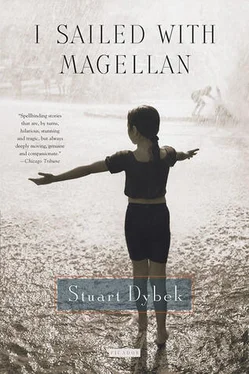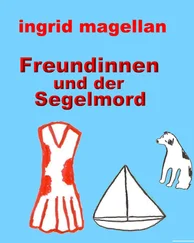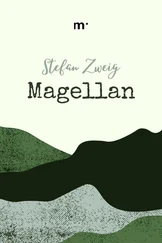“No fuel pump there …,” I started to say, when a greasy Doberman that looked as if it might have been feeding on the corpses lunged out snarling through the busted windshield. We’d never seen a watchdog at the auto pound before. “Goddamn!” I said, my eyes fused to the dog’s, which were hot with fury. “I wouldn’t want to be surprised at night by that.”
“Don’t look! Don’t say anything,” Stosh cautioned. “If the gods don’t think we’ve seen it, then it can’t be used against us as a fucking omen.”
He stomped the gas, and we bounced over the rail tracks at Twenty-sixth just as the gates were dinging down. We followed the curving grade of the tracks along a deserted cobblestone street, then pulled into a concrete tunnel that ran under the railroad embankment. I jumped out and lifted a padlocked metal gate off its rusted hinges, and Stosh drove through the tunnel and onto an oiled cinder road that wound among mountains of scrap metal, coal, rock salt, sand, gravel. He stopped beside a cliff of bricks and broken concrete hauled from demolition sites all over the city and dumped here on the shore of what we referred to as the Insanitary Canal or, more simply, Shit Creek.
We hefted hunks of cinder block into the open trunk to balance the back end against the weight of the engine. No matter how we rearranged the blocks, it seemed to me the car was listing, but I didn’t mention it. Stosh took setbacks with the Merc too hard.
He was rocking the car, woefully shaking his head. “What it really needs now is goddamn heavy-duty shocks,” he said.
“As long as we’re here, we might as well check out the cop cycles,” I suggested, hoping it didn’t sound like a vote of no confidence in the Merc.
Stosh’s brother, Gordo, had told us that beyond the Fire Truck Graveyard there was another junkyard, the Cop Cycle Burial Ground, where old police three-wheelers went to die. According to Gordo, the three-wheelers were taken off the streets after a certain number of miles and not all of them were burned out. They had big Harley engines, and Gordo figured it might be possible to fire them up and drive off with a couple.
I didn’t bother pointing out that tooling around on a stolen three-wheeler with the Chicago Police Department seal on it might be a little conspicuous. But later the idea occurred to me that we could spray-paint them black, drive back streets out of the city in the dead of night, and by dawn have made our getaway to Mexico.
The Fire Truck Graveyard was deserted as always. We’d discovered it back in grade school when we’d pedal our bikes to explore along Shit Creek. The faded red enamel of the rusting trucks looked polished in the baking sun. At their sides, weathered wooden ladders still hung at the ready along with frayed, cracked hoses. A few trucks had big chrome bells waiting to clang. There were fire trucks so old you could see the hitches that had attached them to galloping teams of horses. It was a place where the tangible presence of history inspired a kind of reverence — not a feeling frequently encountered in Chicago — like an outdoor museum but better, because we could clamber around, crank the old hand pumps and winches, sit in the perch on the hook and ladder where the tillerman steered, and no one would bother us.
I could smell the familiar scent of milkweed laced with the creosote reek of the canal, but instead of the usual elation, I was feeling uneasy. The last time I’d been here had been with Laurel, and now it felt as if I’d ruined the place for myself.
I had wanted to sing her song, “Bus Girl,” to her while clanging a fire bell. Just thinking about it made me cringe inside.
I’d shredded the sheet music, not that it erased the scene from my mind. The only thing about the song I’d managed to forget was the original melody, which I’d dreamed one night back in winter. In my dream, she was dancing along the aisle of an empty bus with frosted windows that I was blindly driving, and when I woke I could still remember how lovely the song she was dancing to had been, but the melody itself was vanishing like one of those subatomic particles that decay as soon as they’re created.
Maybe everything with Laurel should have remained a dream. Trying to make it real had ruined it. Maybe my instincts had been right: if we’d just kept meeting as if by accident I’d never have had to wake from that private world of frosted windows. Maybe we could have sustained the intimacy of that corner booth, beside a window blurry with steam and rain, at the neighborhood Chinese restaurant where we took to meeting after her dance class. We’d sit sipping little cups of tea and talking. I loved listening to her, watching the expressions flash across her elfin eyes while she talked. I wasn’t aware I was staring until she observed, “You know, we’ve both got green eyes, except yours are a green brown and mine green blue.”
It was in the Chinese restaurant, sharing the garlic shrimp, that I told her how much I detested high school, especially after they’d expelled my buddy Angel, and that I was boycotting the prom, and Laurel kiddingly said, “Are you sure it’s not because you don’t have a date?”
Kind of kidding back, I said, “Well, now that you mention it, want to go?”
“Okay,” she said, which shocked me, “as long as we don’t end up in the same places everybody else does. I’ve done the prom bit already.”
“I know this jazz club, the Blue Note.”
“Sounds neat. You’ve been there?”
“Sure,” I said, though actually I’d only heard about it from my uncle Lefty, who’d once seen Miles Davis there.
Thinking about her now, I wished that, rather than traipsing down an aisle of obsolete fire trucks beside the Insanitary Canal, I was hacking through jungle, exploring an unmapped river while monkeys yammered and macaws screamed.
Stosh and I crossed an unfenced field where other city vehicles — ambulances, squad cars, paddy wagons — sat junked in the weeds. Beyond them, lined up in a row that bordered the canal, were the three-wheelers.
“Now I understand why cops have to have such fat asses,” Stosh said.
The saddles were huge. We climbed onto a couple and sat working the gears, wringing the accelerators, and squeezing the hand brakes as if racing neck and neck. In the hot sun, with insects and birds twittering from the brush, and the fecal brown canal drifting by in glittering slow motion, more like lava than water, it felt as if we were already somewhere else. I could picture Stosh, Angel, and me, three abreast, tooling down an empty, blazing highway.
“These would be perfect, man,” I said. “They even have trunks. We could keep all our travel shit back there.”
“What travel shit?”
“Blankets, pots and pans, extra clothes …”
“Pots and pans!” Stosh said. “You don’t even have a pot to pee in.”
“That’s exactly what my old man tells me.”
“He’s right. Why the fuck would we bring pots and pans? You know how to cook?”
“I can heat up chili.”
Mexico had been my idea, and every so often, especially when the Merc was causing problems, Stosh could get a little negative. He’d lose sight of it: the three of us on our cop cycles, gunning off the highway onto a dirt road past the glowing Texaco pumps of a small gas station somewhere in Oklahoma maybe, pitching camp beside a river, cooking supper over an open fire, knowing the next day we’d make the border.
“You know how to make Mexican chili?” Stosh inquired.
“Dare I ask?”
“Stick an ice cube up his keister.”
“I don’t get it — too subtle.”
“My old man, the world’s greatest bohunk wit, shared that with me when I told him we were going to Mexico. He suggested we could save ourselves some serious time and money by just walking along Twenty-sixth Street and watching the beaners paint their houses orange and purple.”
Читать дальше












